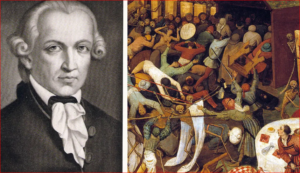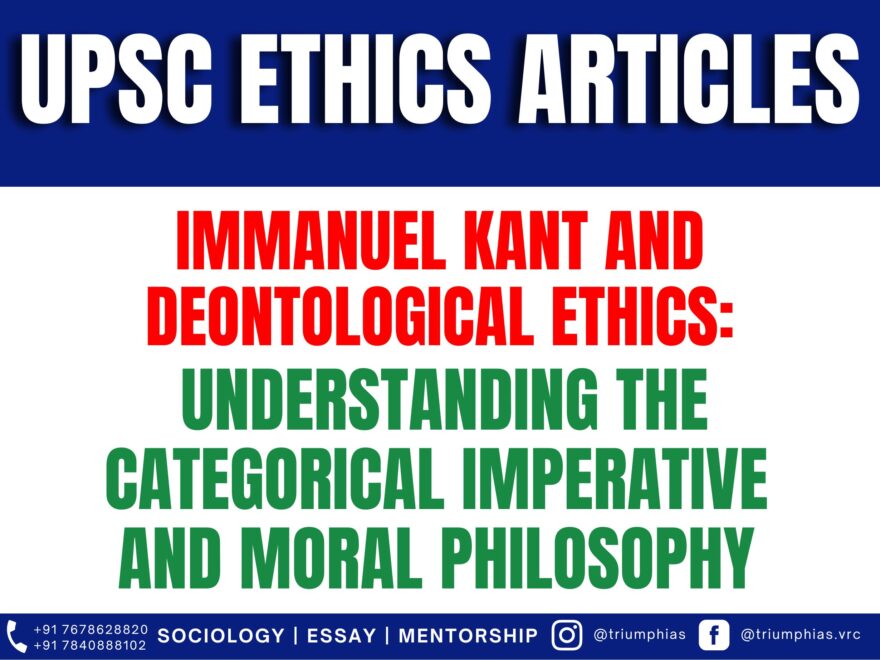Immanuel Kant: Kant’s Deontology
(Relevant for Ethics, Integrity and Aptitude)

Immanuel Kant: Kant’s Deontology
The originator of deontological ethics defines ethical behavior as actions that correctly identify and adhere to the right rules or uphold correct duties.
In the realm of deontological ethics, the anticipated outcomes of actions do not carry significance in the process of moral decision-making and have no bearing on assessments of the moral merit of an action. Instead, ethical judgments are rooted in the intentions of the moral agent and their dedication to duties or rules.
This approach proves valuable in resolving moral dilemmas across various aspects of life, including the public domain (politics, governance, community) and personal life.
The sense of obligation and responsibility that individuals have towards their nation aids in instilling values of non-discrimination. Emphasizing the importance of duty and responsibility plays a crucial role in reinstating peace and harmony within society.
Categorical imperatives
- Kant expressed his ethical theory through a series of “categorical imperatives,” moral statements that possess objective and universal truth due to their inherent qualities rather than their source or outcomes.
- An imperative is a statement that mandates a specific action or refraining from it. The Categorical Imperative, as presented by Kant, grounds morality in the rational capacity of humanity and establishes certain unassailable moral principles. Therefore, it is a monistic normative theory, centered on a single fundamental obligation, principle, or rule.
- In the initial formulation of the categorical imperative, Kant imparts substance to morality by defining right and wrong. He likens it to a “compass” that guides one’s ability to differentiate between good and evil. He proposes that we should “act only according to that maxim by which you can at the same time will that it should become a universal law.” An action is deemed wrong if its guiding principle cannot be willed as a universal law by both oneself and others. What can be universally agreed upon defines what is morally right or wrong, without contradiction.
- In his second formulation, Kant asserts that rational beings should be treated as ends in themselves, not as means to an end. He emphasizes that an individual’s identity is intertwined with the rationality of their actions, rather than their personal desires or inclinations. To be a rational human being entails subjecting ourselves to universal laws and affording the same respect to others as we do to ourselves.
- Kant’s third and final formulation of the categorical imperative centers on the principle of autonomy—specifically, the autonomy of the will. Essentially, it underscores that every rational being possesses the capacity to reason through to necessary conclusions in order to act morally, as a “lawmaker in the realm of ends.”
Collectively, the three formulations of the categorical imperative establish a test for the morality of a given action. In essence, if the guiding maxim or motivation behind an action can be conceived as a universal law and does not violate the dignity of rational beings, then it successfully passes the test and can be deemed morally permissible.
To master these intricacies and fare well in the Sociology Optional Syllabus, aspiring sociologists might benefit from guidance by the Best Sociology Optional Teacher and participation in the Best Sociology Optional Coaching. These avenues provide comprehensive assistance, ensuring a solid understanding of sociology’s diverse methodologies and techniques.
Best Sociology Optional Teacher, Best Sociology Optional Coaching, Sociology Optional Syllabus, Attitude Change, Persuasion, Emotions, Response to Communication, Affective Forecasting, Intuition, Social Influence, Advertising, Health Campaigns, Political Messages, Decision-Making, Ethics, Anderson, Hovland, Terrorism, Drinking Campaigns.

Choose The Best Sociology Optional Teacher for IAS Preparation?
At the beginning of the journey for Civil Services Examination preparation, many students face a pivotal decision – selecting their optional subject. Questions such as “which optional subject is the best?” and “which optional subject is the most scoring?” frequently come to mind. Choosing the right optional subject, like choosing the best sociology optional teacher, is a subjective yet vital step that requires a thoughtful decision based on facts. A misstep in this crucial decision can indeed prove disastrous.
Ever since the exam pattern was revamped in 2013, the UPSC has eliminated the need for a second optional subject. Now, candidates have to choose only one optional subject for the UPSC Mains, which has two papers of 250 marks each. One of the compelling choices for many has been the sociology optional. However, it’s strongly advised to decide on your optional subject for mains well ahead of time to get sufficient time to complete the syllabus. After all, most students score similarly in General Studies Papers; it’s the score in the optional subject & essay that contributes significantly to the final selection.
“A sound strategy does not rely solely on the popular
Opinion of toppers or famous YouTubers cum teachers.”
It requires understanding one’s ability, interest, and the relevance of the subject, not just for the exam but also for life in general. Hence, when selecting the best sociology teacher, one must consider the usefulness of sociology optional coaching in General Studies, Essay, and Personality Test.
The choice of the optional subject should be based on objective criteria, such as the nature, scope, and size of the syllabus, uniformity and stability in the question pattern, relevance of the syllabic content in daily life in society, and the availability of study material and guidance. For example, choosing the best sociology optional coaching can ensure access to top-quality study materials and experienced teachers. Always remember, the approach of the UPSC optional subject differs from your academic studies of subjects. Therefore, before settling for sociology optional, you need to analyze the syllabus, previous years’ pattern, subject requirements (be it ideal, visionary, numerical, conceptual theoretical), and your comfort level with the subject.
This decision marks a critical point in your UPSC – CSE journey, potentially determining your success in a career in IAS/Civil Services. Therefore, it’s crucial to choose wisely, whether it’s the optional subject or the best sociology optional teacher. Always base your decision on accurate facts, and never let your emotional biases guide your choices. After all, the search for the best sociology optional coaching is about finding the perfect fit for your unique academic needs and aspirations.
To master these intricacies and fare well in the Sociology Optional Syllabus, aspiring sociologists might benefit from guidance by the Best Sociology Optional Teacher and participation in the Best Sociology Optional Coaching. These avenues provide comprehensive assistance, ensuring a solid understanding of sociology’s diverse methodologies and techniques. Sociology, Social theory, Best Sociology Optional Teacher, Best Sociology Optional Coaching, Sociology Optional Syllabus.
Best Sociology Optional Teacher, Sociology Syllabus, Sociology Optional, Sociology Optional Coaching, Best Sociology Optional Coaching, Best Sociology Teacher, Sociology Course, Sociology Teacher, Sociology Foundation, Sociology Foundation Course, Sociology Optional UPSC, Sociology for IAS,
Follow us :
🔎 https://www.instagram.com/triumphias
🔎https://www.youtube.com/c/TriumphIAS
https://t.me/VikashRanjanSociology
Find More Blogs
|
Scope of the subject and comparison with other social sciences |
|||
|
|
|
|
Modernity and social changes in Europe |

